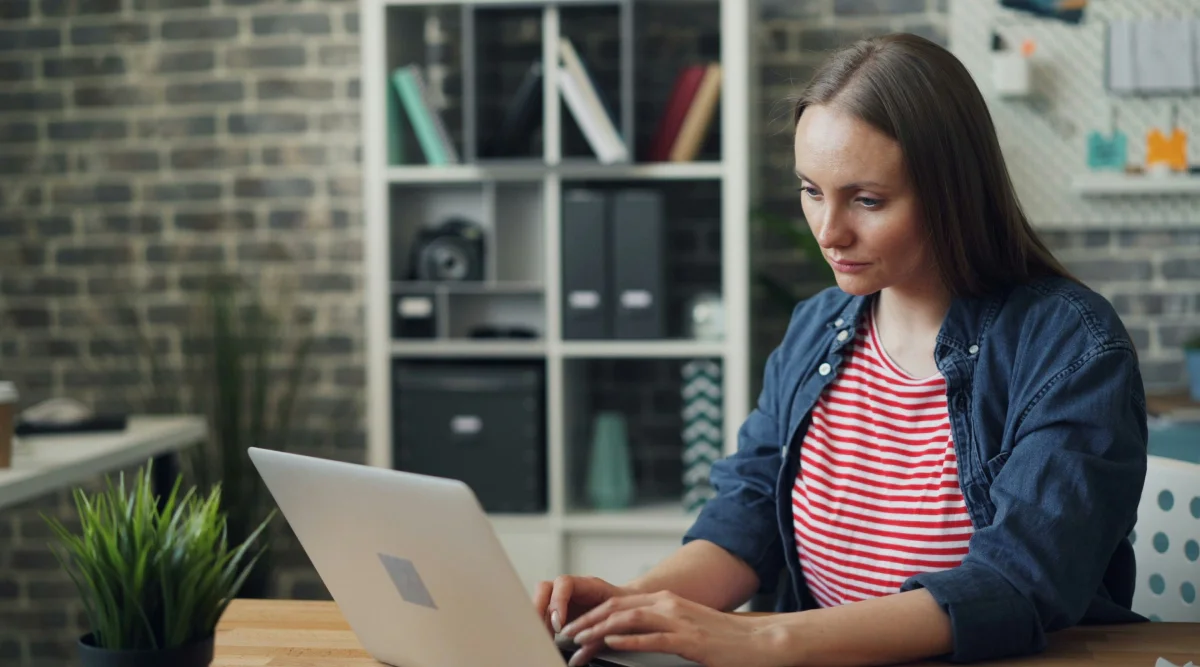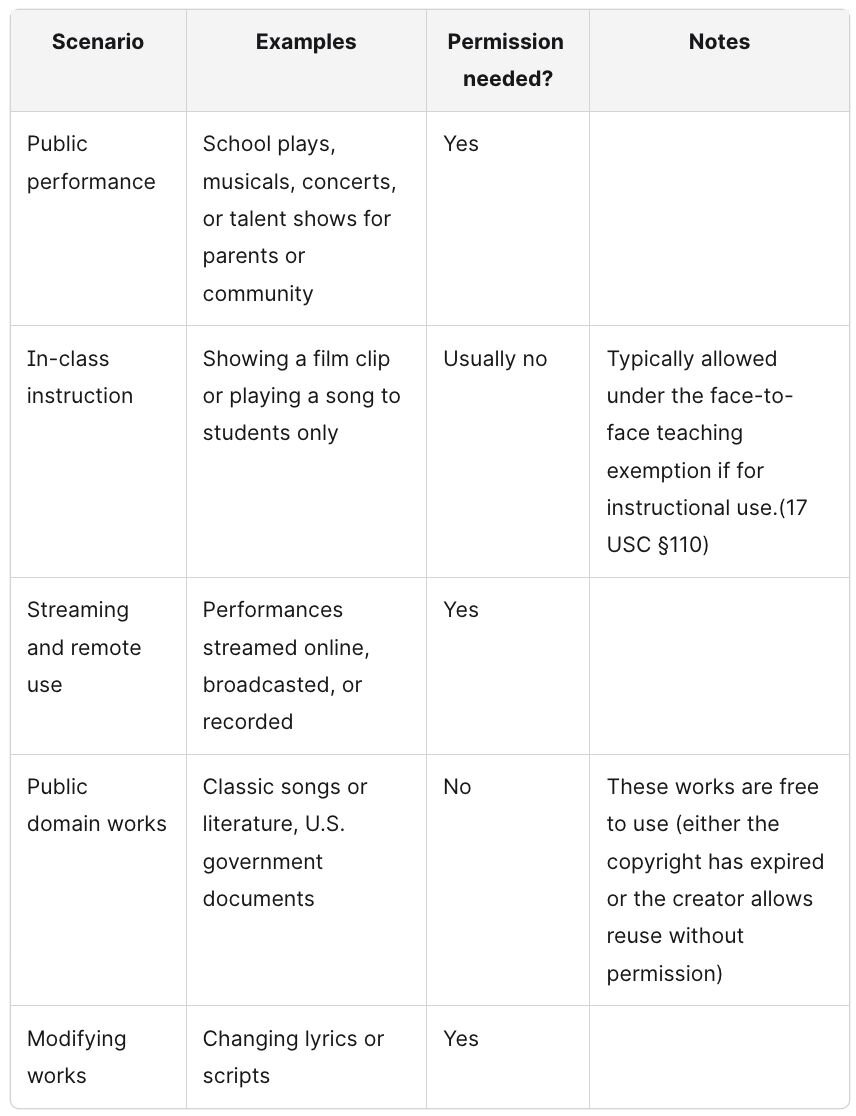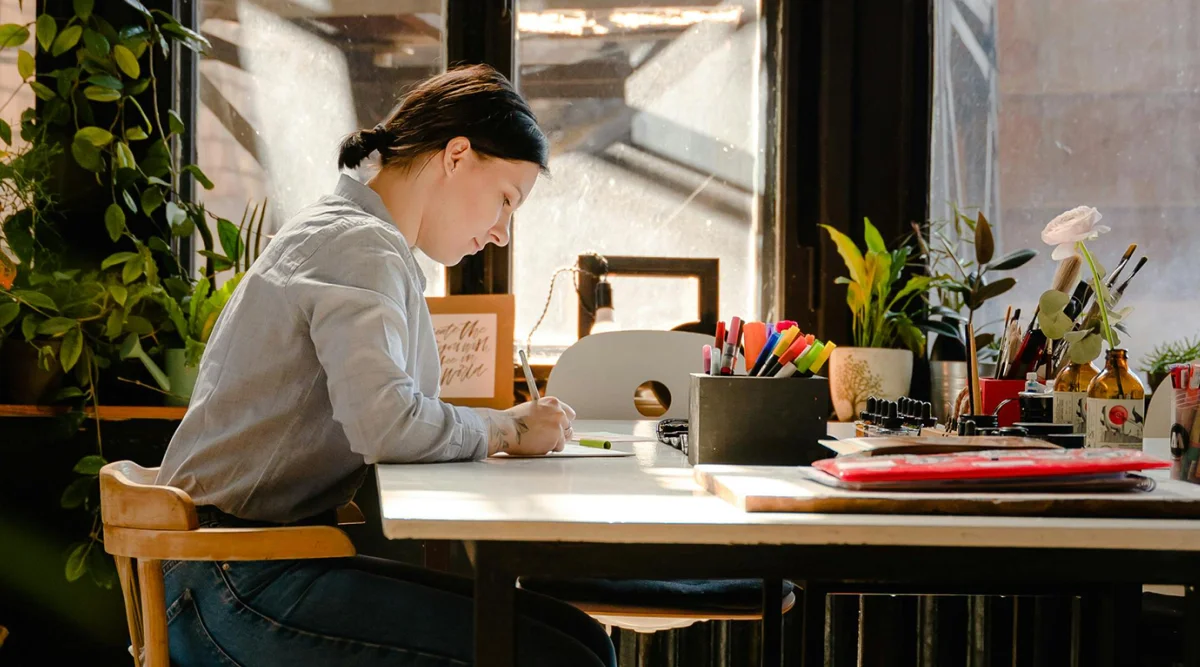Every year, thousands of schools perform well-known plays, musicals, and concerts for their communities. In almost every one of those performances, the material being performed is copyrighted—that is, the intellectual property of a person or company, with full rights to any income generated by the material.
So, what are the legal ramifications of putting on a copyrighted school performance? Do you need permission from the copyright owner? Can the school sell tickets to the play and make a profit? Let's go behind the scenes and get answers to these questions and more.

What is a copyright? Key terms and definitions
Copyright is a form of legal protection that gives creators exclusive rights to their original works, such as plays, music, choreography, and other creative expressions.
All works, whether published or unpublished, are protected by copyright law. Owners have the right to reproduce, distribute, perform, display, and create derivative works based on their creation for as long as the copyright lasts—typically the life of the author plus 70 years (for works created after Jan. 1, 1978).
You’ll often see these terms used in connection with copyrighted works and school performances.
- Public performance: A work performed in front of an audience outside normal teaching curriculum—whether in auditoriums, gyms, outdoor venues, or even classrooms if guests are invited to attend.
- Fair use: A legal doctrine that permits the use of a copyright without permission for certain purposes, such as criticism, commentary, news reporting, teaching, or research. However, fair use doesn't automatically cover all school performances.
- Public domain: Creative works that can be used freely, including expired copyrights, works created by the U.S. government, and works explicitly dedicated to the public domain by their creators.
In short, you generally don’t need permission to use a copyrighted work if the performance falls under fair use or involves a public domain work. But if a work is still under copyright and your use doesn’t qualify for an exemption, then you’ll need permission from the rights holder, often secured through a licensing agreement.
When do schools need permission to use copyrighted works?
To help you determine whether you need permission for your school performance, use this reference table.
| Scenario | Examples | Permission needed? | Notes |
|---|---|---|---|
| Public performance | School plays, musicals, concerts, or talent shows for parents or community | Yes | |
| In-class instruction | Showing a film clip or playing a song to students only | Usually no | Typically allowed under the face-to-face teaching exemption if for instructional use. (17 USC §110) |
| Streaming and remote use | Performances streamed online, broadcasted, or recorded | Yes | |
| Public domain works | Classic songs or literature, U.S. government documents | No | These works are free to use (either the copyright has expired or the creator allows reuse without permission) |
| Modifying works | Changing lyrics or scripts | Yes |

Dramatic vs. non-dramatic works
Dramatic works include plays, musicals, operas, and any performances that tell a story through dialogue, action, and staging. These works almost always require permission for public performance, regardless of whether admission is charged. Even performing a single scene from a play in your classroom may require permission if the performance is open to anyone beyond enrolled students.
Non-dramatic works include individual songs, instrumental pieces, poetry readings, and concerts that don't tell a cohesive story. While these works still enjoy copyright protection, they may qualify for certain educational exemptions if there’s no commercial gain.
However, arranging multiple songs into a theatrical presentation or adding choreography and costumes can transform non-dramatic works into dramatic performances, changing your licensing requirements.
School concert exemption
The Copyright Act includes a specific exemption for certain school concerts under Section 110(4), but this exemption has strict requirements, including the following:
- The performance must be of a non-dramatic literary or musical work (individual songs, not full musicals)
- There can be no direct or indirect commercial advantage (no profit motive)
- Performers, promoters, and organizers cannot receive payment
- Either admission is free, or all proceeds go exclusively to educational, religious, or charitable purposes
- The copyright owner hasn't objected in writing following proper notice
Even when all these conditions are met, the exemption only applies to live, in-person performances. It doesn't cover dramatic works, recordings, broadcasts, or online streaming.
How to use copyrighted material in your school
Before using any copyrighted material, you’ll want to verify whether your use qualifies for an exception. If you run into questions, you might consult an attorney for advice, such as the ones you can find through LegalZoom’s network.
Here are some strategies to keep in mind as you plan your school’s performance.
Step 1: Identify if the work is protected or public domain
Start by researching the copyright status of any work you're considering. Works published before 1928 are generally in the public domain in the United States as of 2025. For works published between 1928 and 1977, copyright status depends on whether copyright was renewed. Works published after 1978 are typically protected for the author's life plus 70 years.
Reliable resources for checking copyright records include the following:
Remember that arrangements, translations, or adaptations of public domain works may have their own copyright protection. Always verify the specific edition or version you plan to use.
Step 2: Determine if the performance is public or private
Next, think about the context in which the copyright will be used by asking yourself these questions:
- Who can attend the performance? (students only vs. open invitation)
- Where will it occur? (classroom vs. auditorium)
- What's the purpose? (instruction vs. entertainment)
- Will it be recorded or broadcast?
If any element makes the performance "public," proceed to the next steps for obtaining permission.
Step 3: Assess exemption eligibility
Review whether your planned use qualifies for fair use or the school concert exemption. Consider the following:
- Are you using the entire work or just excerpts?
- Is the work dramatic or non-dramatic?
- Will admission be charged, and if so, how will the proceeds be used?
- Have you altered the work in any way?
If you're unsure, it's safer to talk to a copyright attorney than risk infringement. Be sure to document your findings and plans to use the material in case questions arise later.
Step 4: Contact Rights Holders or Licensing Agencies
For most school performances, you'll request permission from established licensing agencies to use the copyrighted material. Here are some common agencies to look into.
For plays and musicals:
For individual songs and concerts:
Most agencies offer online applications that streamline this process, but you’ll want to start well in advance, as processing can take several weeks. You’ll typically need to provide details about your performance dates, venue size, ticket prices, and number of performances. Be prepared to pay licensing fees upfront or shortly after approval.
Step 5: Keep records and communicate expectations
After receiving approval, keep track of all your records, such as:
- Copies of all licenses and permissions
- Payment receipts
- Correspondence with rights holders
Then, make sure you communicate all compliance rules and expectations with all stakeholders. For instance, you might need to inform staff about restrictions on recording or streaming the performance, educate parents about recording limitations, or post copyright restriction notices at the venue.
How LegalZoom can help with copyright compliance
LegalZoom offers comprehensive support for schools and educators navigating copyright requirements, including the following:
- Assistance with copyright registration for original student works and school productions
- Contract review for licensing agreements and performance rights
- Legal consultations to answer specific questions about fair use and educational exemptions
Through our network of experienced attorneys, you can receive personalized guidance on copyright situations for an affordable and predictable price, helping you stay within budget constraints.
Copyright laws and school performances FAQs
Do I need permission for a free school concert?
Even free performances typically require permission if they're open to the public and feature copyrighted material. The school concert exemption only applies to non-dramatic works performed under specific conditions, including no payment to performers and proceeds (if any) going solely to educational purposes.
Can I change lyrics or adapt a script for a school play?
No, you cannot alter copyrighted works without written permission from the copyright holder. This includes changing lyrics to remove inappropriate content, adapting scripts for different cast sizes, or translating works into other languages. Such changes create "derivative works" that require explicit authorization. Many licensing agencies offer pre-approved school editions with appropriate modifications.
Are there special rules for virtual or streaming performances?
Yes, virtual performances have different requirements than in-person shows. Digital transmission rights are separate from standard performance rights and aren't covered by educational exemptions. Most licensing agencies now offer streaming licenses, but requirements may include geo-blocking, limited viewing windows, and restrictions on recording. Always specify your intent to stream when applying for licenses.
What happens if I use copyrighted music without permission?
Copyright infringement can result in statutory damages ranging from $750 to $30,000 per work, or up to $150,000 for willful infringement (17 USC §504). Schools may receive cease and desist orders requiring immediate cancellation of performances. Beyond financial penalties, infringement can damage your school's reputation and relationship with licensing agencies, making future permissions more difficult to obtain.
Heleigh Bostwick contributed to this article.

